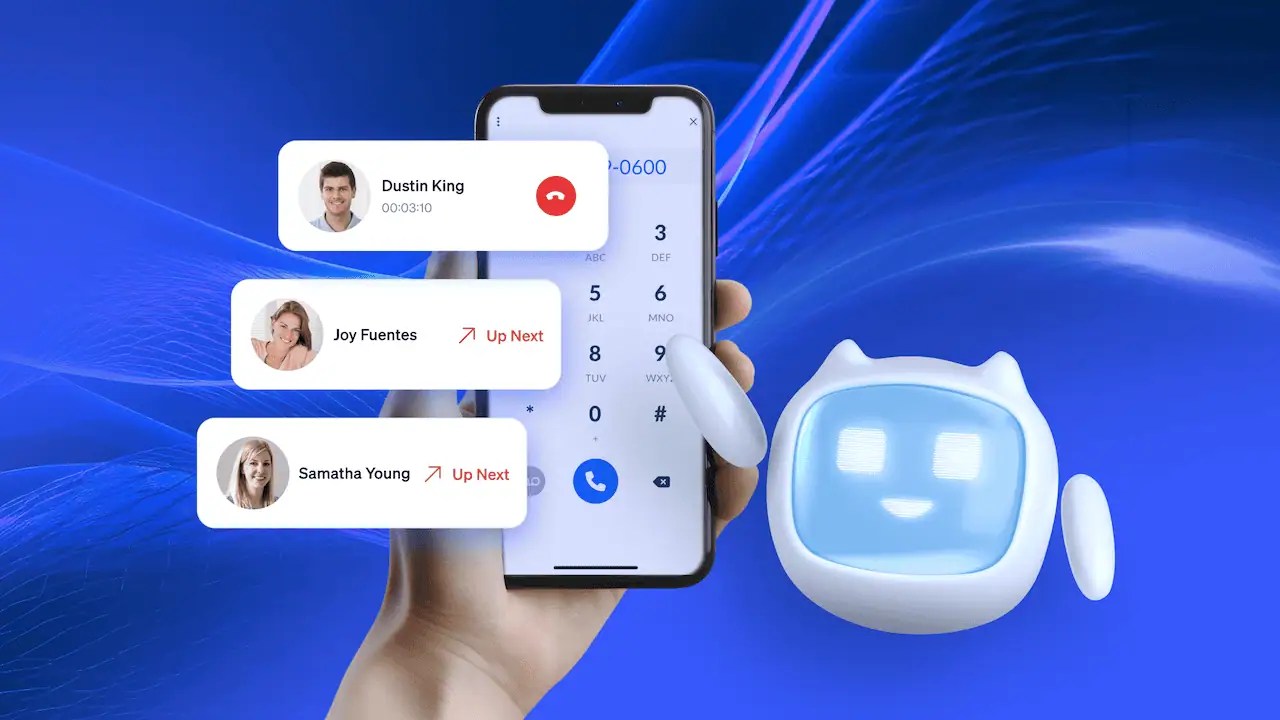Customer service departments are increasingly turning to enterprise-grade contact centers to help manage both inbound and outbound calls rather than relying on their traditional, on-premises phone systems.
Consumers’ expectations for customer service standards have continued to rise, and 80% of businesses say they expect to compete based on customer experience. As a result, it’s more important than ever to offer prompt, skilled customer support at every touchpoint, and leveraging call centers for customer service can help you do that.
Benefits of a Call Center for Customer Service
There are multiple benefits of outsourcing customer service to call centers, including scalability, cost-effectiveness, flexibility, and improved customer experience.

Scalability
Staffing can be a significant concern for internal customer service departments. It can be difficult to scale hiring and scheduling for internal teams, even if you’re prepared for peak call times.
With inbound call centers, however, you can easily adjust agent numbers based on call volume. Scaling both up and down is easy, which means that customer calls will consistently be answered in a timely manner and customer satisfaction rates may increase accordingly.
Cost-effectiveness
Outsourcing to call centers doesn’t require any up-front investment in software or hardware. Many offer pay-as-you-go pricing models, charging based on usage. Since there aren’t any significant up-front costs, you can allocate those funds toward other initiatives to improve the customer experience or even increase promotional outbound calls.
Related: Contact Center Outsourcing: Pros, Cons, & How to Get Started
Flexibility
Cloud-based call center software allows live agents to work remotely, such as the top-rated call center from Nextiva.
In fact, a study found that 98% of workers expressed the desire to work remotely at least part of the time. Remote options allow call centers to attract top customer service talent regardless of geographic location.

In addition to the flexibility of attracting top talent from anywhere, you also get round-the-clock support. This standard is difficult to maintain when relying exclusively on internal team members but is easily accomplished when working with call centers.
Improved customer experience
Brands can create a unified customer experience by delivering consistent, personalized interactions at touchpoints throughout the customer journey.

Call centers can help create that unified experience by leveraging skilled agents who learn about your brand, products, and support policies to provide high-level customer care. As your customer experience improves, increases in customer loyalty, customer retention, brand reputation, and revenue often follow.
How to Set Up Your Customer Service Flow
When you work with a call center, it’s crucial to set up your customer service flow for success. That starts with choosing a call center solution.
Choose a provider
Choosing call center software is the first step in setting up your customer service flow.
When choosing a contact center solution, research the following:
- Available features: Look for important functionality like smart call routing, call recording, and auto attendants.
- Pricing: Find a provider that offers the features and usage you need at a price that’s within budget.
- Scalability: Make sure the provider can meet your needs in the future as you scale up.
- Integrations: Look for software that integrates with your existing tech stack.
- Customer experience: Read reviews online to learn more about customer support standards, call quality, and service uptime.
When demoing different solutions, note each platform’s ease of use and ask about onboarding support and setup.
Related: 20 Questions to Ask a Call Center Service Provider Before You Sign
Design your call flow
Your call flow is the path customers are directed down when they call your business.

Map out your customer journey and determine how — and where — you want to direct calls to maximize customer engagement. You can use automation through interactive voice response (IVR), auto attendants, and skill-based routing rules to effectively direct calls to the right call center agents.
Train your agents
Internal agents and agents in external call centers all need dedicated training on your company’s products and services, customer support policies, and cloud platform.
Teach agents how to handle customer issues based on your internal practices, including when to escalate an issue to a supervisor or an internal agent.
Integrate your CRM with the call center
Your customer relationship management (CRM) software stores customer interactions across multiple communication channels. By integrating your CRM system with your call center solution, you grant agents seamless access to customer data and activity history.
When agents receive an inbound call, a screen pop will show CRM data to allow for personalized support.

Essential Call Center Customer Service Features
Choosing the right call center technology improves the customer service experience. Here are several features to look for in a call center phone system.
Automatic call distributor
An automatic call distributor uses smart routing to direct inbound calls to the most qualified available agents. Callers are patched through to agents who can best help them faster.
IVR
IVR offers self-service options for basic inquiries while directing complex calls to agents. For example, you may use IVR to answer basic questions about an order’s shipment status but direct customers needing refunds to live agents.

Call recording & monitoring
Call recording for inbound and outbound calls allows call center managers to review agent performance, monitor quality assurance, and track customer sentiment. Use this information to identify areas of improvement and then train your team accordingly. Recorded calls can protect your company in case of customer disputes.
Real-time analytics
Call analytics allow you to track metrics like call volume, wait times, caller sentiment, and individual agent performance. This information is invaluable in workforce management, allowing call centers to proactively consider staffing and scheduling needs.
Omnichannel support
Offer seamless customer service across digital channels, including voice, video, email, chat, social media, and SMS text messages. Customers have unique communication preferences, and it is essential to connect with them when they reach out on their platform of choice. Omnichannel customer service is the new standard.

Call center integrations
Call center solutions often come with diverse integration options. Integrate with your CRM, knowledge base, help desk, and other essential business software to facilitate a unified customer experience.
Key Roles in a Customer Service Call Center
Customer service call centers have complex staffing needs with multiple important roles.
Customer service agents
Agents respond to customer calls, answer customer inquiries, troubleshoot problems, and resolve client issues.
Set up contact center agents for success by doing the following:
- Create defined call scripts that cover multiple scenarios.
- Provide training on your business’s products, services, support policies, and brand voice.
- Educate staff on account verification processes to protect customer data.
- Provide regular, encouraging feedback from supervisors based on call analytics data and call recording reviews.
- Grant access to FAQs with knowledge bases for agent use.
Supervisors
Supervisors monitor agent performance, provide ongoing training, and ensure agent adherence to call center protocols and industry regulations.
Help call center managers succeed by doing the following:
- Select call center solutions that offer managers dashboards to oversee staff performance, including wallboards for team stats.
- Provide shared access to generate and review custom reports.
- Develop clear objectives that they can optimize for and share with the team.

Trainers
Trainers develop and implement training programs for new agents and create programs for ongoing professional and skills development.
Facilitate success for trainers by doing the following:
- Use automatic call recording so trainers can assess audio recordings to find room for growth.
- Provide call flow access.
- Offer supervisor and agent user profiles for demonstration purposes.
Quality assurance specialists
Quality assurance specialists review call recordings and evaluate agent performance based on set metrics. They also ensure that agents are consistently upholding a brand’s customer care practices.
Help quality assurance specialists succeed by doing the following:
- Grant access to call records, including audio files and transcripts.
- Choose solutions that offer historical and current customer experience data.
- Set up agent screen recording, which shows what agents see while taking customer calls.
Related: Methods for Improving Customer Engagement in a Call Center
Tips for Onboarding Your Customer Service Team Faster
Support agents are customer-facing. Training them effectively is important so they can represent your brand well. Following a few customer service best practices can help onboard new agents quickly.
Predesigned workflows
Create prebuilt call scripts that take agents through the progression of standard phone calls. You can also build templates or guided workflows for common customer inquiries. By creating scripts, templates, and workflows for agents to follow, you can help them learn how to handle customer calls quickly.
Sync your CRM & customer data
Relevant data that’s available at the click of a button — or, even better, through an automatic screen pop — helps agents access information at any point during customer communications. They can create better, more personalized customer experiences, which increase customer satisfaction scores as customer effort scores decrease.
Knowledge base access
Provide agents with easy access to a comprehensive knowledge base containing essential product and brand information. Agents can use this knowledge base to provide technical support to customers, stay updated on product features, and get fast answers to popular FAQs.
Peer mentoring
Establish a peer mentoring program among senior and junior call center agents. This can foster knowledge sharing and support within your team. Mentorship can allow agents to improve their skills, accelerating career advancement and increasing team member retention.
Feedback loops
Encourage regular feedback from agents to improve the onboarding and training process. Agents are the first line of defense in customer service, so they may also have input about customer concerns or ineffective support policies.
Customer Service Teams Thrive With Nextiva
Some customer service teams are increasingly turning to call centers to help manage both inbound and outbound calls. Other teams are growing internally and relying on call center solutions to improve the customer experience.
Either way, take advantage of call center benefits, including cost-effectiveness, scalability, flexibility, and increased customer satisfaction. Customer service tools like Nextiva can help customer service departments capture those benefits.
Nextiva offers the following features, which can help customer service departments and call centers excel:
- High reliability with 99.999% uptime
- Dedicated 24/7 support for all customers
- Transparent, affordable pricing
- Advanced call management with IVR, call recording, auto attendants, and call routing features
- Call analytics to optimize workflow management
- An easy-to-use, intuitive dashboard
- Support through onboarding and setup processes
And, for call centers looking to grow beyond voice support, Nextiva offers a powerful artificial intelligence contact center solution for omnichannel support. Our omnichannel contact center software allows you to accept customer contact across multiple platforms, including SMS messaging, video, and voice.
Related: How to Choose the Best Call Center Service Provider for Your Business
Your complete call center solution.
See why top brands use Nextiva to handle calls at scale. Easy to use. Fast setup.

















 Customer Experience
Customer Experience 








